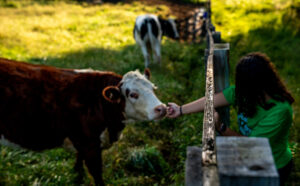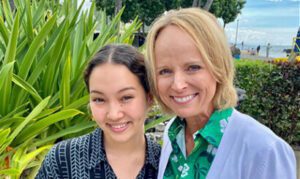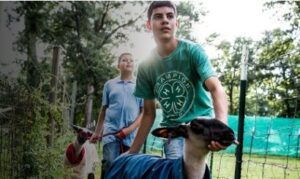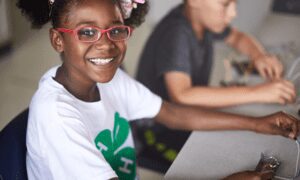Individuals who have special needs can participate in lots of activities – they just need support. Even I need support when it comes to some tasks in my life. I’m a big-picture thinker, which means I struggle to plan for small details in my life. That doesn’t mean I’m left to figure it out myself or fail. I simply ask for support.
My friend Jacob and my brothers Asher and Elias aren’t fortunate to have the verbal communication skills to ask for support when they need it, so I look for ways to support them based on their needs.
For my friend Jacob, support means two pairs of extra hands – a person to push his wheelchair and a person to keep the goat from eating its tires – and learning to use a device that helps him speak through pressing buttons. This requires teaching the goat to stay calm around a big, scary wheelchair. I also spend lots of time teaching Jacob all about his goat; what keeps it calm, what might scare it, what it eats, and how to name body parts when the judge asks.
My little brother Asher thrives on routine. To show a goat, Asher needs help developing a routine for moving around the show ring. Asher also has severely limited verbal communication. He and I spend much of our training time learning simple body parts he can point to and show the judge. We walk into the show ring with a laminated index card that tells the judge which questions Asher has practiced.
My youngest brother, Elias, has no trouble leading a goat much bigger than him. In the summer, he can often be found leading his goat and as many others up and down the driveway. Elias is more than strong enough to lead a goat in the right direction; he is ready to learn finer steps to goat showing. Fine-tuning, however, requires patience. Supporting Elias means teaching him that goats respond to gentleness and positive correction.
Through my involvement in 4‑H, I have been lucky to have a support system that encourages me to be a leader and help bring positive change to my community. Knowing I have a team of mentors and friends who are always there for me has given me the confidence to take on challenges and step out of my comfort zone to try new things. I encourage you to think about how you can provide support to those in your community – especially those who struggle to ask for it. You don’t have to have a degree in psychology or childhood development to figure out how to offer support. Often, support can come even in the smallest, simplest of things which can mean the world to an individual.
















